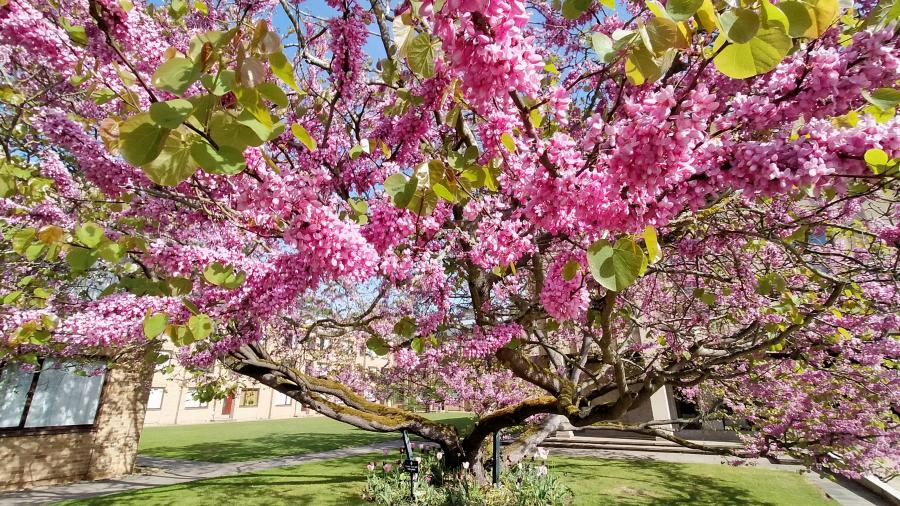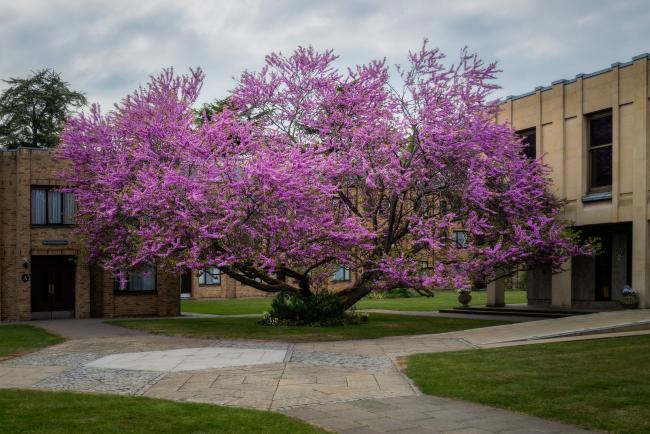How to rebuild a city with Karam Alkatlabe


It’s a moment of transient beauty: Wolfson’s iconic Judas tree flowers for around three to four weeks each year, attracting people to College from far and wide to enjoy its splendour.

In April, the bright pink flowers spectacularly emerged again. But if you haven’t enjoyed the tree in flower already, you likely only have only a few weeks before the flowers disappear again for another year.
Indeed, time is against the Judas tree in a broader sense. Although Judas trees can live up to 100 years in the wild, rotting at the base of the Wolfson tree could see the College centrepiece come down much sooner.
“I just don’t want it going down on my watch” is the heartfelt admission of head gardener Oscar Holgate, who has been keeping a close eye on the Judas tree in recent years since rot was discovered at the base of the right flank.
“It wouldn’t take much to bring it down now," he says, "with enough heavy rain to weigh down the foliage and then a heavy breeze, that could be it.”
There is, however, a new tree growing at the centre of the Wolfson Judas tree. Although the left flank of the older tree is supported by two struts, Oscar says that once the right side goes, the left would also be cut back to allow the new baby tree at the centre to grow - and hopefully one day ascend to the iconic status of its forebear. It will have a lot to live up to, with many calling Wolfson's Judas tree "the best in Cambridge".
“That’s the story of the garden really," says Oscar, "it’s in a constant state of flux and there’s always something new to see, even when we lose parts that we’re fond of.”
The Judas tree gets its name from the belief that this is the type of tree from which Judas Iscariot hanged himself after betraying Jesus: an event said to have turned the tree's white flowers red. The name could also come from a mistranslation of the French name, Arbre de Judée (tree of Judea), referring to the hilly regions of that country where the tree used to be common.
The tree is just one of many highlights in the College gardens, including the magnolia in the sundial garden and the monkey puzzle tree, which has recently been moved outside of Fuch’s House.
The gardening team also have plans to enable access to the fruit trees when ripe, as well as pickable herbs around College and a new “cutting garden” where College members can cut flowers to display in their rooms. The idea for this came when Oscar was told by a student that the bright colours outside their bedroom window had helped keep them going through their exams, and wanted to take some back with them.
“The blossoming of the Judas tree in Wolfson is a wonderful sign of the start of spring!” says PhD student Millie Race. “It’s just one of the special parts of the Wolfson garden, but at this time of year it is definitely the most lovely. Having it at the front of College is so welcoming and cheery and I think it reflects the overall atmosphere of the College.
“It’s great to be in a College where the qualities and values of our College, like openness, collaboration and sustainability, are reflected in the environment and the garden. Everyone is encouraged to enjoy all areas of the garden as there are no private Fellows gardens; students and staff are encouraged to work and socialise in the garden spaces; and there is definitely a focus on biodiversity and sustainability from the gardening team.”
Students can be seen making the most of the gardens throughout the year, and recently Laura Jeffrey, librarian at the Lee Library, has created outdoor seating behind the library to offer even more study spaces for students to choose from.
You can now follow the Wolfson gardening team on instagram: @wolfsoncollegegardens.
And you can share your photos of the Judas tree with us on Twitter, Instagram, and Facebook.
Main photo: Wolfson JRF, Dr Hannah Forde.

Wolfson's Judas tree







